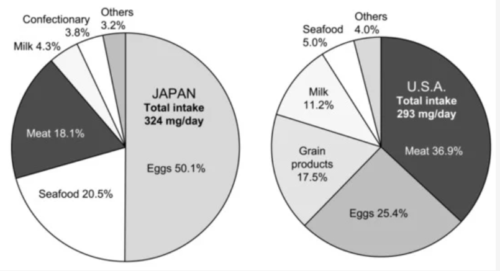Industry-funded opinon of the week: eggs and cholesterol
Nutritional Viewpoints on Eggs and Cholesterol. by Michihiro Sugano and Ryosuke Matsuoka. Foods 2021, 10(3), 494; https://doi.org/10.3390/foods10030494
Opinion: This review says that although Japanese people eat more eggs than Americans, they may be protected against higher cholesterol levels due to the differences in everything else they eat (more seafood, for example?).

Conclusion: “Although randomized controlled trials with long-term follow-up are required to evaluate the association between consumption of eggs and human health, available information, at least from the nutritional viewpoint, suggests that egg is a healthy and cost-efficient food worldwide.”
Conflicts of interest: “M.S. declares no conflicts of interest, and R.M. is an employee of Kewpie Corporation. There are no other patents, products in development, or marketed products to declare. Kewpie Corporation has no conflicts of interest with this research.”
Comment: Really? No conflicts of interest? But Kewpie is Japan’s #1 mayonaise company. Kewpie says that it “uses about four billion eggs a year. Recognizing that eggs contain all the necessary ingredients for creating life, we continually study ways of effectively utilizing such ingredients and manufacture fine chemicals for use in a broad range of food, cosmetic, and pharmaceutical applications.”
One of those ways, apparently, is to get its employees to write opinion pieces like this.
With that said, concerns about eggs and cholesterol have diminished in recent years. The 2020 Dietary Guidelines for Americans says not a word about eggs and cholesterol; it just recommends eggs as a source of protein. A study in the American Heart Association Journal finds no association between eggs and heart disease mortality.
The American Heart Association notes that eggs are the leading source of dietary cholesterol but their negative effects may be confounded by the fact that they are so often eaten with bacon and sausage. The AHA egg recommendations:
- Vegetarians (lacto-ovo) who do not consume meat-based cholesterol-containing foods may include more dairy and eggs in their diets within the context of moderation discussed herein.
- Patients with dyslipidemia, particularly those with diabetes mellitus or at risk for heart failure, should be cautious in consuming foods rich in cholesterol.
- For older normocholesterolemic patients, given the nutritional benefits and convenience of eggs, consumption of up to 2 eggs per day is acceptable within the context of a heart-healthy dietary pattern.
And even with that said, the authors should have disclosed Kewpie’s evident conflicted interests.

